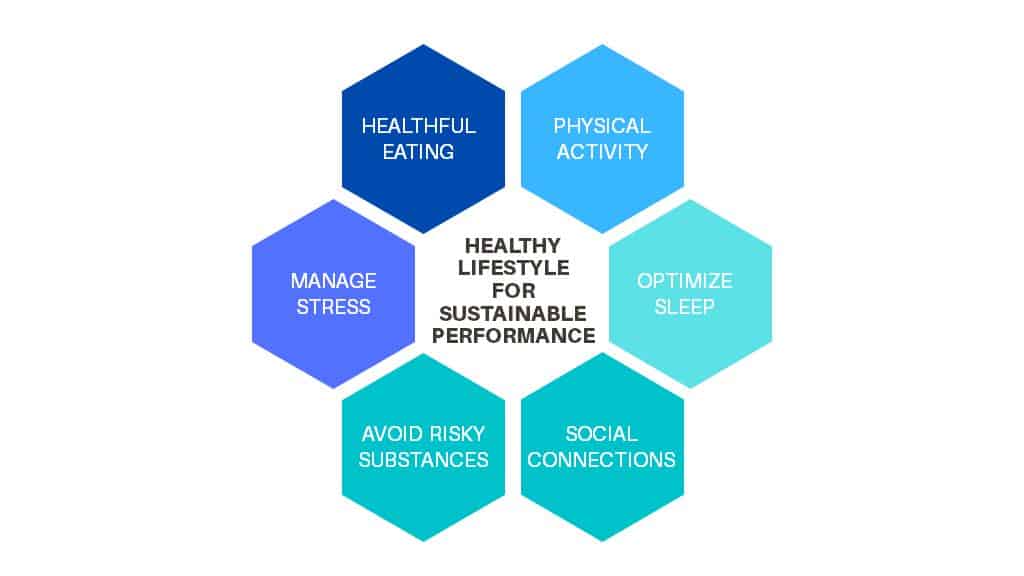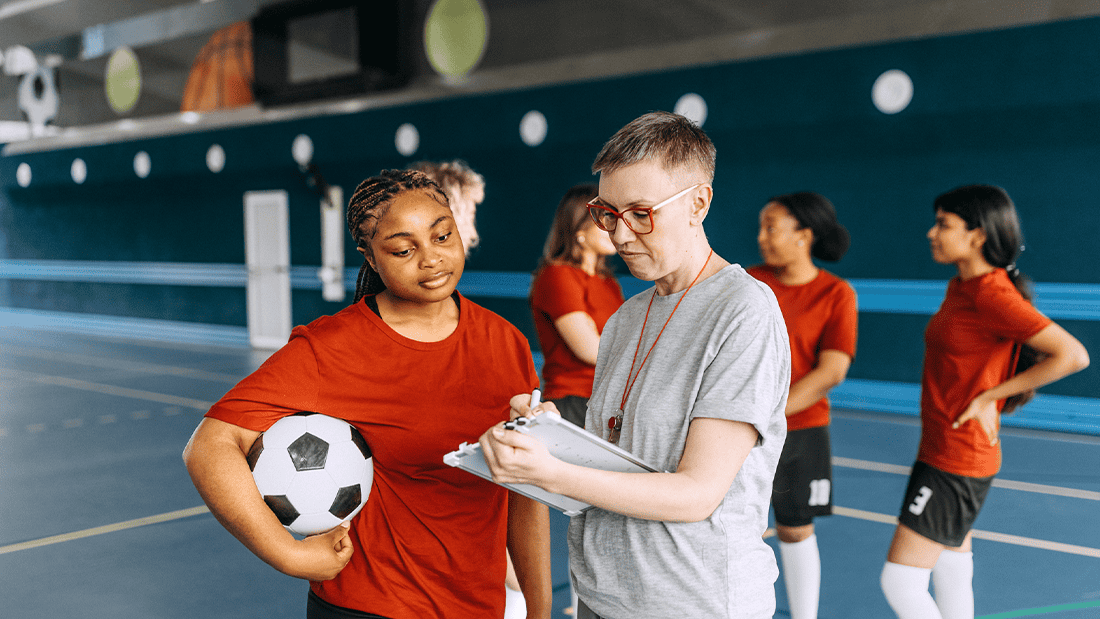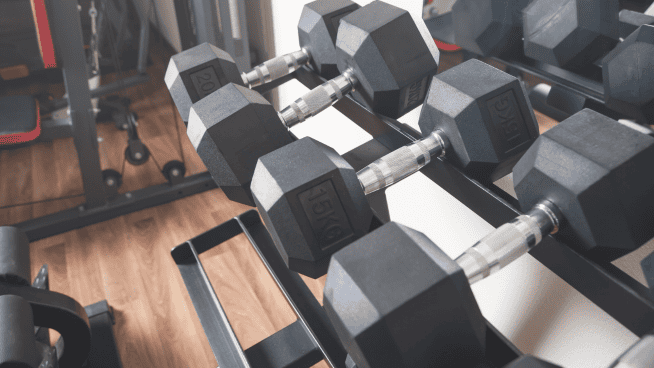What is Lifestyle Medicine?
According to the American College of Lifestyle Medicine website, lifestyle medicine is “the use of evidence-based lifestyle therapeutic intervention—including a whole-food, plant-predominant eating pattern, regular physical activity, restorative sleep, stress management, avoidance of risky substances, and positive social connection—as a primary modality, delivered by clinicians trained and certified in this specialty, to prevent, treat, and often reverse chronic disease.”
However, a healthy lifestyle may also be used to help treat injuries and enhance long-term athletic performance. In other words, if an athlete is sick, injured, or not feeling well, it will be hard for them to train and compete at a high level.
Let’s look at six reasons how a healthy lifestyle can athletes a way to recover faster from injury and illness and help sustain a high level of performance during a season.

Healthful Eating
Many coaches know that proper nutrition is essential for overall health and disease prevention. It is also critical for high-performing athletes. Good food not only fuels the body but also helps with repair and recovery.
The American College of Sports Medicine, Academy of Nutrition and Dietetics, and Dietitians of Canada compiled a position statement in 2016 stating the importance of proper dietary guidelines to optimize athletic performance. In fact, a new field of culinary medicine is emerging.
An article in the American Journal of Lifestyle Medicine, culinary medicine “blends the art of food and cooking with the science of medicine” to “help prevent and treat disease and restore well-being.”
For the latest in nutrition research, refer to the Academy of Nutrition and Dietetics website. To optimize performance, athletes need to learn the basics of cooking and selecting healthful foods for energy and recovery.
Physical Activity and Sports Conditioning
According to American College of Sports Medicine, physical activity is not only crucial for athletic performance but also to improve cardiovascular and respiratory function, reduce cardiovascular disease risk factors, decrease morbidity and mortality, decrease anxiety and depression, enhance cognitive function, and enhance the quality of life.
Once an athlete is no longer competing, sports conditioning will transfer into physical activity for lifelong health. Coaches play a critical role in preparing athletes for competition and wellness once they retire from their sport.
Managing Stress
Mental stress management is critical for daily life and work, school, and athletic performance.
An article in the British Journal of Sports Medicine indicates that athletes should be monitored for eating disorders, depression, anxiety, overtraining, sleep disorders, and attention-deficit disorders.
Coaches should keep in mind that stress management for athletes may include mindfulness meditation, music for relaxation, massage with aromatherapy, and mind-body movements such as yoga, tai chi, or qigong.
Optimizing Sleep
Getting proper sleep can play a role in athletic performance. A systematic review in Sports Medicine shows that interventions, such as sleep hygiene, are essential for athletes.
For example, according to an article, coaches can use practical sleep hygiene guidelines, including sleeping in a cool, dark, and quiet room. Coaches should also encourage athletes to strive for a regular bedtime routine, minimize late-night meals, and avoid caffeine and high-intensity training near bedtime.
For more personalized details, athletes should work with their healthcare provider to optimize sleep, especially for competition involving long travel distances.
Avoiding Risky Substances
Coaches know that smoking, tobacco use, drug abuse, and excess alcohol consumption can harm health and impair athletic performance. One study concludes that alcohol use should not be used to reward hard work and good athletic performance.
Instead, teams should find alternative ways to reinforce outstanding effort and victories.
Another study published in PLoS One shows that alcohol ingestion may impair recovery and adaptation.
For further information about preventing and managing substance abuse, coaches may refer to the National Institute on Alcohol Abuse and Alcoholism, National Center for Complementary and Integrative Health, and the National Institute on Drug Abuse.
Staying Socially Connected
Life can’t be all about hitting the gym, catching a workout, or competing. Coaches should encourage athletes to engage in fun and social activities to stay mentally and physically balanced.
Social connections with family and friends can help an athlete remain grounded and prevent burnout, overtraining, and anxiety. A happy and well-rested mind and body can allow an athlete to maintain focus during a long season.
In fact, one study found that being socially connected with peers even during a pandemic is vital for overall well-being.
RECOMMENDED FOR YOU
MOST POPULAR
What is Lifestyle Medicine?
According to the American College of Lifestyle Medicine website, lifestyle medicine is “the use of evidence-based lifestyle therapeutic intervention—including a whole-food, plant-predominant eating pattern, regular physical activity, restorative sleep, stress management, avoidance of risky substances, and positive social connection—as a primary modality, delivered by clinicians trained and certified in this specialty, to prevent, treat, and often reverse chronic disease.”
However, a healthy lifestyle may also be used to help treat injuries and enhance long-term athletic performance. In other words, if an athlete is sick, injured, or not feeling well, it will be hard for them to train and compete at a high level.
Let’s look at six reasons how a healthy lifestyle can athletes a way to recover faster from injury and illness and help sustain a high level of performance during a season.

Healthful Eating
Many coaches know that proper nutrition is essential for overall health and disease prevention. It is also critical for high-performing athletes. Good food not only fuels the body but also helps with repair and recovery.
The American College of Sports Medicine, Academy of Nutrition and Dietetics, and Dietitians of Canada compiled a position statement in 2016 stating the importance of proper dietary guidelines to optimize athletic performance. In fact, a new field of culinary medicine is emerging.
An article in the American Journal of Lifestyle Medicine, culinary medicine “blends the art of food and cooking with the science of medicine” to “help prevent and treat disease and restore well-being.”
For the latest in nutrition research, refer to the Academy of Nutrition and Dietetics website. To optimize performance, athletes need to learn the basics of cooking and selecting healthful foods for energy and recovery.
Physical Activity and Sports Conditioning
According to American College of Sports Medicine, physical activity is not only crucial for athletic performance but also to improve cardiovascular and respiratory function, reduce cardiovascular disease risk factors, decrease morbidity and mortality, decrease anxiety and depression, enhance cognitive function, and enhance the quality of life.
Once an athlete is no longer competing, sports conditioning will transfer into physical activity for lifelong health. Coaches play a critical role in preparing athletes for competition and wellness once they retire from their sport.
Managing Stress
Mental stress management is critical for daily life and work, school, and athletic performance.
An article in the British Journal of Sports Medicine indicates that athletes should be monitored for eating disorders, depression, anxiety, overtraining, sleep disorders, and attention-deficit disorders.
Coaches should keep in mind that stress management for athletes may include mindfulness meditation, music for relaxation, massage with aromatherapy, and mind-body movements such as yoga, tai chi, or qigong.
Optimizing Sleep
Getting proper sleep can play a role in athletic performance. A systematic review in Sports Medicine shows that interventions, such as sleep hygiene, are essential for athletes.
For example, according to an article, coaches can use practical sleep hygiene guidelines, including sleeping in a cool, dark, and quiet room. Coaches should also encourage athletes to strive for a regular bedtime routine, minimize late-night meals, and avoid caffeine and high-intensity training near bedtime.
For more personalized details, athletes should work with their healthcare provider to optimize sleep, especially for competition involving long travel distances.
Avoiding Risky Substances
Coaches know that smoking, tobacco use, drug abuse, and excess alcohol consumption can harm health and impair athletic performance. One study concludes that alcohol use should not be used to reward hard work and good athletic performance.
Instead, teams should find alternative ways to reinforce outstanding effort and victories.
Another study published in PLoS One shows that alcohol ingestion may impair recovery and adaptation.
For further information about preventing and managing substance abuse, coaches may refer to the National Institute on Alcohol Abuse and Alcoholism, National Center for Complementary and Integrative Health, and the National Institute on Drug Abuse.
Staying Socially Connected
Life can’t be all about hitting the gym, catching a workout, or competing. Coaches should encourage athletes to engage in fun and social activities to stay mentally and physically balanced.
Social connections with family and friends can help an athlete remain grounded and prevent burnout, overtraining, and anxiety. A happy and well-rested mind and body can allow an athlete to maintain focus during a long season.
In fact, one study found that being socially connected with peers even during a pandemic is vital for overall well-being.












